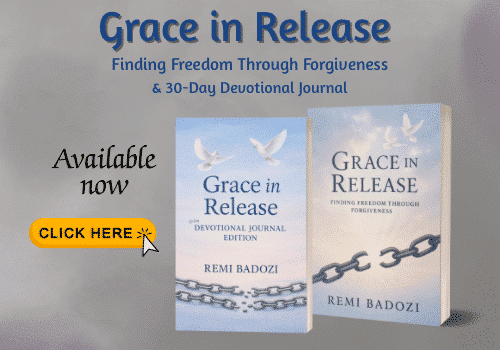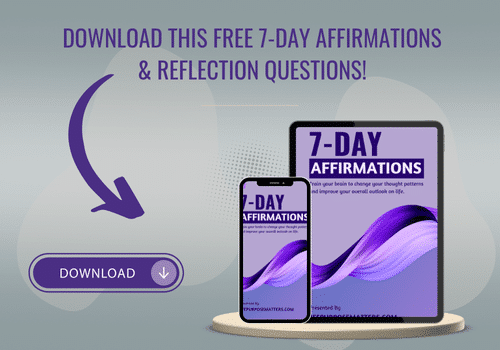This is another soul-stirring article for you, ladies! So, grab your favourite beverage, and join me on this journey! 💜 This devotional explores the difference between aloneness and loneliness, and how God can meet us in the quiet with healing, clarity, and holy companionship.
Table of Contents
ToggleThere comes a time in many women’s lives, often quietly, and sometimes painfully, when we begin to question the relationships we’ve held onto. I am not referring to marital relationships or romantic ones, but also friendships, family ties, or emotional entanglements that no longer reflect peace, purpose, or mutual care. We stay, sometimes, because we fear the silence that follows goodbye.
But, what if that silence is sacred? 🤔
Not long ago, I came across the story of Jane Green, a well-known author who admitted she stayed in an unfulfilling marriage far longer than she should have, not because of love, but because the thought of being alone frightened her more than the reality of being unhappy.
“My dying marriage made me look and feel so old,..” – JANE GREEN
This article isn’t about Jane Green or any of her life choices; it’s about what I experienced and what was dropped into my heart while reading it.
Her honesty stirred something in me. Because the truth is, many women (including the old me!) quietly live with and still experience that tension. Sometimes we remain tied to relationships – whether romantic, family ties, or even friendships (and sometimes jobs! That’s an article in itself! 😎), not because they nurture us, but because the idea of being “alone” feels unbearable.
I’ve observed and heard it in conversations, especially among women who whisper their worries: “What if I never find someone else?” “ I don’t think I’ll ever find a better church.” “What will people think if I walk away?” “Isn’t being alone worse than staying where I am?” “What if everyone stops talking to me?” “What if….”
And yet, what if aloneness is not a punishment but a sacred invitation? What if the very space we fear could become the place where God meets us most deeply?
From a Christian perspective, the concepts of aloneness and loneliness are distinct, even though they may feel similar at times. Below is an explanation of the difference.
Defining the Terms – Aloneness vs. Loneliness
It’s important to pause and name the difference.
Loneliness
Loneliness is an emotional state and can be a painful ache. It’s the feeling of sadness or emptiness that comes from a perceived lack of connection with others. In a Christian context, loneliness can arise when a person feels disconnected from God or their community. It’s often associated with isolation and a deep sense of being forgotten or unloved. This feeling can be especially painful for someone who is in a relationship that is not spiritually or emotionally nourishing, leading to a sense of isolation even when they are not physically alone. So, basically, it’s that hollow feeling of being unseen, unheard, or disconnected, even when you’re surrounded by people. Loneliness whispers, “You are forgotten. You don’t matter.” It drains the spirit and leaves us searching for scraps of validation.
Aloneness
Aloneness, however, is something different; it is a physical state. The deliberate act of being by oneself, a choice to be in solitude. It is like stepping into a quiet garden where the soul can breathe again. It is a space where peace is possible, where creativity awakens, and where the voice of God can be heard more clearly. For a Christian, this is often an intentional time set aside to be alone with God. This practice, modelled by Jesus in the Gospels, is a way to deepen one’s relationship with the divine, free from the distractions of the world and other people. This is a time of spiritual recharging, self-reflection, and prayer. Aloneliness, therefore, is the garden where peace grows slowly and faithfully.
One is a barren desert. The other is a hidden garden. One leaves you empty. The other invites you into intimacy with God.
When It’s Time to Release
Some relationships feel like a warm blanket in winter. Others, like a threadbare covering that no longer shields us from the cold. Here are gentle signs that a relationship may no longer serve your spiritual or emotional well-being:
- ✔️ You feel emotionally drained after each interaction.
- ✔️ You compromise your values or silence your voice to keep the peace.
- ✔️ You stay out of fear, of being alone, misunderstood, or unloved.
- ✔️ You sense God nudging you toward peace, but the relationship pulls you toward unrest.
Releasing doesn’t mean rejecting, it simply means honouring what was, while trusting God with what’s next.
“Come to Me, all who are weary and burdened, and I will give you rest.” — Matthew 11:28
Why We Stay: The Emotional and Spiritual Cost
So why do we stay bound to relationships that no longer serve our souls?
- ✔️ Sometimes it’s the fear of being alone, believing solitude is failure or rejection.
- ✔️ Sometimes it’s the fear of being unseen, thinking our worth depends on who chooses us.
- ✔️ Often, it’s because culture and even church communities have made partnership the marker of value, as if womanhood is incomplete without it.
And in today’s world, social media amplifies the pressure. Smiling couples, laughing friends, and curated lives can make it seem as though everyone else has found their “happily ever after.” To step away from a draining connection feels like stepping out of line, as though you’ve missed what everyone else seems to have.
But here’s the cost: staying in connections that diminish us silences our spirit. Over time, we forget the sound of our own joy. We trade God’s invitation to wholeness for the illusion of belonging.
The Christian Benefits of Aloneness
For a Christian woman who struggles with clinging to relationships that are no longer healthy or never were, embracing aloneness can be a profoundly beneficial and healing spiritual discipline.
When we embrace aloneness, it shifts from emptiness to sacredness. Solitude becomes a practice of restoration.
1. It allows for a deeper connection with God
When you are alone, you remove the distractions of other people’s needs, opinions, and emotional baggage. This creates a sacred space where you can focus entirely on your relationship with God. In the silence, you can hear His voice more clearly, understand His will for your life, and find comfort and strength in His presence. This intimate time with God can provide the validation and love that you may have been seeking in unhealthy relationships.
Engage in prayer walks: With each step, notice God’s creation, the rustle of leaves, the warmth of sunlight. Let creation remind you that you are held.
2. It fosters spiritual clarity and discernment
Being alone allows you to step back from the emotional chaos of codependent or one-sided relationships. In this space, you can ask God to reveal the truth about your situation. Are these relationships aligned with His purpose for you? Are they drawing you closer to Him or pulling you away from Him and from your life purpose? This time of reflection and prayer can help you to see the relationships as they truly are, not as you wish them to be, and to gain the wisdom to make healthy choices.
Journal Daily: By journaling daily, you can pour out the clutter of your heart on paper. Let the blank page become a safe space for truth and prayer. ==>> Check out our store for Journals <<==
3. It strengthens your sense of self-worth
When you find your identity in Christ, rather than in your relationships, you will begin to see yourself as He sees you – beloved, valued, and worthy. Spending time alone with God reinforces this truth, helping you to build a foundation of self-worth that is not dependent on anyone else’s approval or presence. This newfound confidence will empower you to set boundaries and to let go of relationships that drain you.
Birth creative expression: Write, paint, sing, or dance. Let your gifts become a form of worship, turning solitude into song!
4. It is a time for rest and spiritual renewal.
The act of clinging to unhealthy relationships is exhausting. It takes a toll on your emotional, mental, and spiritual well-being. Deliberate aloneness, however, is restorative. It is an opportunity to rest in God’s peace, to surrender your burdens to Him, and to be spiritually and emotionally renewed. This period of rest is not a punishment for being in a bad relationship; it is a gift from God to prepare you for the healthy, life-giving connections He has for you in the future.
What if we reframed “alone time” as “God time”? Imagine solitude not as exile, but as a holy appointment with the One who calls you beloved. 💜
If you have read this far, thank you for joining me on this journey! 🌸You deserve another cuppa!! 😉 Kindly read this next paragraph twice, then grab another cup of your favourite beverage.
Some opportunities can be missed due to clinging to unfulfilling relationships, sacrificing personal goals, or failing to address important issues. This creates a stagnant environment where growth and new possibilities are stifled. It also involves missing “windows of opportunity” in relationships to acknowledge and resolve problems, leading to further complications. Additionally, certain types of relationships, such as those lacking emotional connection or characterised by constant conflict, can drain your energy and emotional bandwidth. This, in turn, makes it harder for you to recognise or pursue other potential connections and opportunities. 🕊️ & 🤍
Biblical Anchors
God never equates solitude with shame. In fact, scripture shows us something radically different: aloneness is often the very space where God meets His children.
- ✔️ Jesus withdrew to lonely places to pray (Luke 5:16). His aloneness was not despair but communion with the Father.
- ✔️ Psalm 34:18 assures us: “The Lord is close to the brokenhearted and saves those who are crushed in spirit.” Loneliness does not repel God; it draws Him near.
- ✔️ Ruth left everything familiar after deep losses, walking into a new season of uncertainty. Her courage opened the door for God to weave redemption into her story.
- ✔️ Paul lived single yet fulfilled. His solitude became fertile ground for ministry, not a mark of lack.
- ✔️ And remember Elijah under the broom tree (1 Kings 19)? He was overwhelmed and despaired; he begged God to take his life. Yet it was in that very solitude that God came, not in the wind, earthquake, or fire, but in a gentle whisper.
God does not despise our aloneness. He sanctifies it.
Practical Encouragement
If you are in a season where certain relationships feel heavy rather than life-giving, here are some gentle ways forward:
- ✔️ Discern with prayer: Ask God honestly, “Does this connection draw me closer to You or away?”
- ✔️ Notice your spirit: Do you feel lighter or more burdened after time together?
- ✔️ Take small steps of detachment: Sometimes that means setting boundaries, sometimes taking space, and sometimes walking away altogether. When you walk, do so graciously and be prepared to be ignored or treated ungraciously by the one(s) you held on to. 🤔
Here are some journaling prompts to guide you:
- ✔️ What does peace feel like to me?
- ✔️ Which relationships drain me, and which restore me?
- ✔️ Where do I sense God asking me to let go?
- ✔️ What practices bring me back to joy?
- ✔️ What am I afraid of losing if I let go?
- ✔️ What might I gain – emotionally, spiritually, and creatively, if I embrace aloneness with God?
Remember, stepping away doesn’t mean stepping into isolation. Build a circle of women, mentors, and communities who uplift rather than entangle.
Reason, Season and a Lifetime
As I reflect on relationships, I’m reminded of the saying, “Some relationships are for a reason, some are for a season or a lifetime.” This suggests that people enter our lives (or we enter people’s lives) for specific purposes (reasons), for a limited duration (seasons), however long or short it may be, or for a lifetime.
Relationships that are for a reason help us (or we help them) meet specific needs, provide support, or teach us (or them) important lessons before the relationship comes to an end. On the other hand, relationships that are for a season bring joy, shared experiences, and personal growth, but their conclusion is a natural part of life. Both types of relationships hold value, teaching us to embrace the impermanence of certain connections and appreciate the gifts they offer, whether they last for a short time or a lifetime.
Key Takeaways from this saying:
- ✔️ Acceptance: Understand that not all relationships are meant to last forever, and that’s perfectly okay.
- ✔️ Gratitude: Be grateful for the gifts and lessons people bring into your life, regardless of how long they stay or you stay.
- ✔️ Letting Go: It’s important to allow people to move on when their time in your life is over, making space for new relationships and personal growth. Trust me, it can be very difficult for the person who is leaving, as they are often stepping into the unfamiliar. Don’t add to their hardship; instead, be gracious and release them, entrusting their journey to God as they move forward. Remember the saying, “Don’t slam the door when you leave.” Likewise, don’t slam the door (literally) when someone leaves you; be GRACIOUS.
Conclusion – Aloneness and Loneliness:
In conclusion, while loneliness can be a painful state of emotional disconnect, aloneness, from a Christian perspective, is a powerful tool for spiritual growth. By intentionally embracing solitude, a Christian woman can strengthen her relationship with God, gain clarity about her relationships, build a secure sense of self-worth, and find the rest needed to move forward with a renewed spirit.
Closing Reflection: The Beauty of Becoming
There is a quiet kind of becoming that takes place when we are alone. Not the loneliness that longs for validation, but the aloneness that listens for God’s voice in the stillness. It’s in this space, free from performance and unburdened by expectations, that we begin to remember who we truly are.
Whose you are
You are not forgotten, and you are not forsaken.
You are not less because you walk alone.;
You are being refined, not rejected.
God is drawing you deeper, not dismissing.
In the absence of noise, heaven sings louder.
In the absence of distraction, your soul breathes freer.
Let this be your season of sacred solitude.
Let it be the field where peace is planted, and purpose blooms.
“Be still, and know that I am God.” — Psalm 46:10
Guided Prayer
Take a deep breath. Find a quiet space. Picture Jesus sitting across from you, His eyes full of compassion. Then say to Him:
Father, You see the hidden places of my heart.
You know the fears I carry and the ache of loneliness.
Lord, I confess the fear that rises when I imagine life without certain relationships.
I’ve clung to what feels familiar, even when it no longer feels fruitful.
Teach me to trust the sacredness of solitude.
Remind me that You are near, not just in the noise, but in the quiet.
Lord, give me courage to release what no longer brings life nor reflects Your peace.
And in the space that remains, plant something beautiful.
Thank You, Lord, that I am never truly alone, for You are with me always.
In Jesus’ name, Amen.
If you are interested in the story of Jane Green 👈🏾



